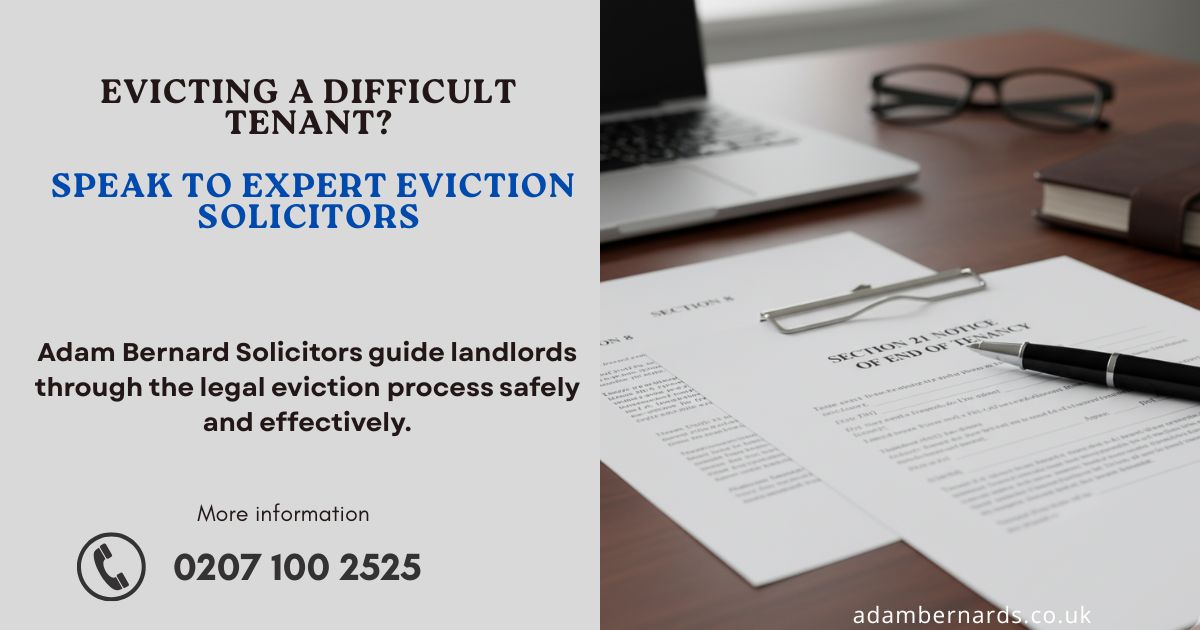London’s private renting sector is evolving quickly. Both landlords and tenants need to be aware of their legal rights in light of new laws, rising rents, and greater demand. The Renters’ Rights Bill, which was introduced by the UK government in 2025, significantly changed the way evictions are handled.
For landlords, this means that “no-fault” evictions under Section 21 will no longer occur. Tenants will benefit from increased security and defence against wrongful evictions. The most recent developments, their effects on London’s eviction procedures, and how specialised tenant eviction solicitors can assist you in navigating them are all covered in this article.
The End of Section 21 Evictions
In London, landlords used Section 21 notifications to evict residents without providing a reason for decades. These “no-fault” evictions gave landlords the opportunity to swiftly reclaim their property, frequently at the conclusion of a lease.
But starting in 2025, Section 21 will no longer exist. In order to evict someone, landlords must give a valid reason.
- Instead of being fixed-term secured shorthold tenancies, the tenancies will be rolling (periodic).
- Landlords must provide evidence-based eviction grounds under Section 8 or new grounds.
- One of the biggest adjustments to landlord-tenant law in decades is this one.
New Grounds for Eviction
The removal of Section 21 does not leave landlords helpless. The following are some of the updated and expanded reasons for possession under Section 8:
- Rent arrears: Serious or ongoing arrears are still a good reason.
- Antisocial behaviour: Disruptive or illegal activity by tenants may result in their eviction.
- Property sale: If a landlord intends to sell after a certain amount of time, they may reclaim possession.
- Landlord occupation: When a close relative or landlord wants to reside on the property.
Notice periods have also been adjusted, with some requiring longer notice (up to four months) depending on the ground.
What This Means for London Landlords
For landlords in London, these changes mean:
- Greater accountability under the law. You have to give the right notice, on the right grounds, and with the right proof.
- Longer schedules. Evictions could take longer than they used to.
- Requirements for compliance. Along with other safety requirements, properties must adhere to the Decent Homes Standard.
- Conflict risk. Tenants can now contest eviction in court or through the newly appointed Private Renters’ Ombudsman.
What This Means for London Tenants
For tenants, the reforms provide:
- Greater security. No more risk of sudden, unexplained eviction.
- Fairer rights. Tenants can challenge invalid notices or unfair treatment.
- Improved housing standards. Landlords must maintain safe, habitable homes.
- Access to resolution. Disputes can be addressed through an independent ombudsman without going directly to court.
How Tenant Eviction Solicitors in London Can Help
At Adam Bernard Solicitors, our experienced landlord and tenant lawyers provide expert guidance on all aspects of eviction law. We help landlords and tenants across London by:
- Explaining your rights under the new Renters’ Rights Bill.
- Drafting and serving valid eviction notices that comply with updated legislation.
- Representing you in court if disputes arise.
- Advising on property compliance and landlord obligations.
- Protecting your investment while ensuring fair treatment of tenants.
With offices in London, we combine local knowledge with legal expertise, ensuring smooth and compliant eviction procedures.
Summary: Tenant Eviction Law in London – 2025 Update
The abolition of Section 21 marks a new era for the London rental market. Evictions will now require clear legal grounds, longer notice periods, and greater compliance from landlords. Tenants will enjoy stronger security and access to fairer dispute resolution.
Whether you are a landlord seeking possession or a tenant facing eviction, navigating these reforms requires professional legal support.
At Adam Bernard Solicitors, we specialise in landlord and tenant law. Our expert tenant eviction solicitors in London are ready to help you understand your rights, protect your interests, and act swiftly in any eviction case.
📞 Call us today on 0207 100 2525
📧 Email: info@adambernards.co.uk
Take the stress out of tenant eviction in London – let our team guide you through the new law.
Frequently Asked Questions
I’ve always used Section 21 to regain possession. What can I do now?
A solicitor can advise which Section 8 grounds apply, help gather the right evidence, and ensure notices are valid.
“What if I want to sell my London property?”
You’ll still be able to, but only after the protected period. Solicitors can guide you on timing and notice requirements to avoid costly mistakes.
“My tenant is in arrears — how long will eviction take?”
New rules allow action on repeated arrears, even if the tenant clears short-term debts. Legal support is vital to present the case correctly
How do I know if my property meets the new standards?”
Solicitors can advise on compliance and help you avoid enforcement penalties.
Can landlords in London still use Section 21 notices?
No. Section 21 “no-fault” evictions are being abolished. Landlords must now rely on specific grounds under Section 8 or the new rules.
What are the main new grounds for eviction?
Landlords can seek possession for reasons such as rent arrears, anti-social behaviour, wanting to sell, or moving themselves (or family) into the property.
Will landlords still be able to evict tenants who don’t pay rent?
Yes. Rent arrears remain a valid ground. Repeated arrears (even if paid off temporarily) can also justify eviction.
How long is the notice period under the new rules?
It varies. Typically 2 months, but up to 4 months if the landlord wants to sell or move back in.
How long is the notice period under the new rules?
It varies. Typically 2 months, but up to 4 months if the landlord wants to sell or move back in.
What is a “protected period”?
This is the minimum tenancy period (expected to be 12 months) during which landlords cannot use certain grounds, like selling or moving in, to evict.
What happens to fixed-term tenancies
They will be replaced by rolling (periodic) tenancies. Tenants will give 2 months’ notice to leave, while landlords must use valid grounds.
Can tenants challenge eviction notices?
Yes. Tenants can dispute notices if they believe they’re invalid, retaliatory, or based on incorrect grounds.
How will property standards affect landlords?
Homes must meet the Decent Homes Standard. Failure to comply could block eviction attempts or lead to fines.
Do these rules apply to existing tenancies or only new ones?
Both. The reforms will convert all new and existing private rentals into the new tenancy model.
Will landlords lose control of their property?
Not entirely. Landlords still have rights to recover possession, but they must follow stricter procedures with clear, legal reasons.
How a Solicitor Can Help Landlords
Adam Bernard Solicitors provide expert advice, prepare valid notices, represent you in disputes, and ensure compliance with new eviction rules. Contact us today: 📞 0207 100 2525 | 📧 info@adambernards.co.uk















